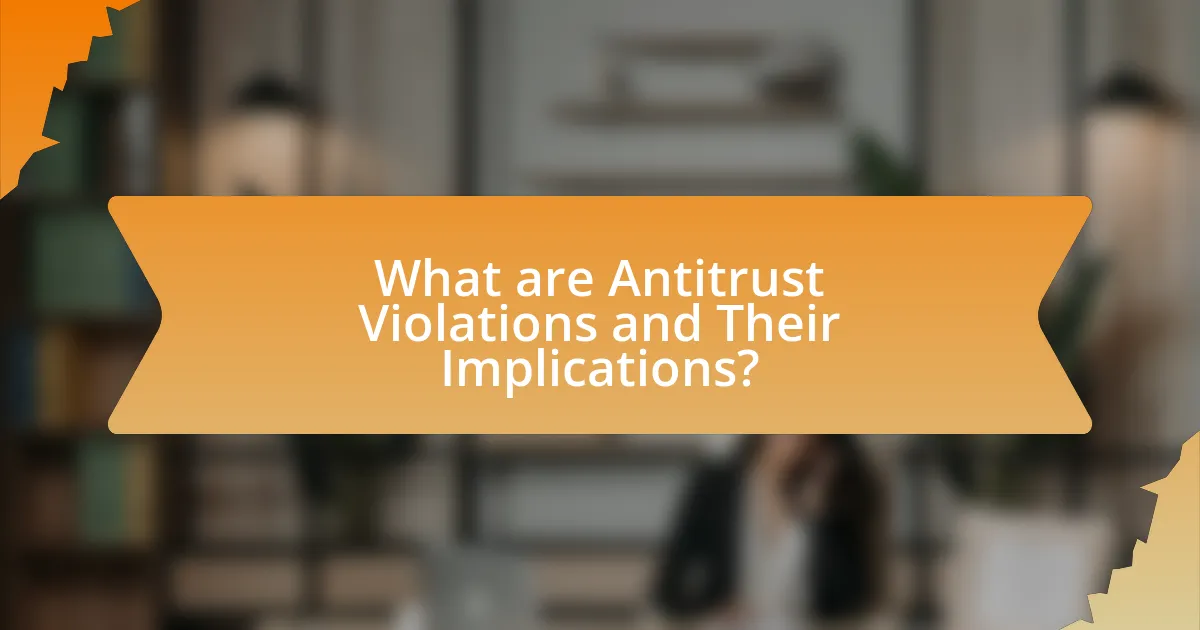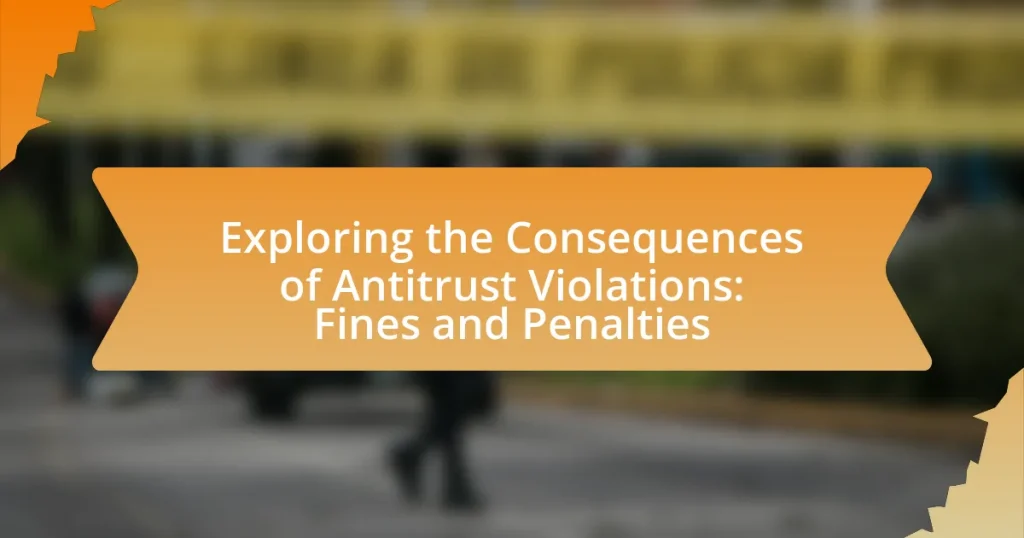Antitrust violations refer to illegal business practices that restrict competition, such as price-fixing, monopolization, and collusion. These violations can lead to severe legal consequences, including substantial fines and operational changes mandated by regulatory authorities. The article explores the definitions and implications of antitrust violations, the types of penalties imposed, and the impact on businesses and consumers. It also discusses the importance of compliance programs, the role of legal counsel, and strategies for companies to recover from penalties and rebuild trust with stakeholders.

What are Antitrust Violations and Their Implications?
Antitrust violations occur when businesses engage in practices that restrict competition, such as price-fixing, monopolization, or collusion. These violations undermine market fairness and can lead to significant legal consequences, including hefty fines, penalties, and changes in business practices mandated by regulatory authorities. For instance, in 2020, the European Commission fined Google €4.34 billion for antitrust violations related to its Android operating system, illustrating the severe financial repercussions that can arise from such actions.
How do antitrust laws define violations?
Antitrust laws define violations primarily as actions that restrain trade or commerce, including practices such as price-fixing, monopolization, and collusion among competitors. These laws aim to promote fair competition and prevent anti-competitive behavior that can harm consumers and the economy. For instance, the Sherman Act of 1890 explicitly prohibits contracts, combinations, or conspiracies that restrain trade, while the Federal Trade Commission Act of 1914 addresses unfair methods of competition. Violations can lead to significant penalties, including fines and injunctions, as enforced by regulatory bodies like the Federal Trade Commission and the Department of Justice.
What are the common types of antitrust violations?
Common types of antitrust violations include price fixing, market allocation, bid rigging, and monopolization. Price fixing occurs when competitors agree to set prices at a certain level, undermining free market competition. Market allocation involves competitors dividing markets among themselves to avoid competition in specific areas. Bid rigging is a form of collusion where competitors coordinate bids to manipulate the outcome of a bidding process. Monopolization refers to the actions taken by a company to establish or maintain a dominant market position, often through anti-competitive practices. These violations disrupt fair competition and can lead to significant legal penalties and fines.
Why are antitrust laws important for market competition?
Antitrust laws are important for market competition because they prevent monopolistic practices and promote fair competition among businesses. By prohibiting anti-competitive behaviors such as price-fixing, market allocation, and monopolization, these laws ensure that no single entity can dominate the market to the detriment of consumers and other businesses. For instance, the Sherman Act of 1890 laid the foundation for antitrust enforcement in the United States, leading to significant cases like the breakup of Standard Oil in 1911, which restored competitive market conditions. This historical context illustrates how antitrust laws actively maintain a level playing field, fostering innovation and consumer choice.
What are the potential consequences of antitrust violations?
Antitrust violations can lead to significant legal and financial consequences for companies involved. These consequences typically include hefty fines imposed by regulatory authorities, which can reach billions of dollars depending on the severity of the violation. For instance, in 2019, the European Commission fined Google €1.49 billion for antitrust practices related to online advertising. Additionally, companies may face civil lawsuits from affected parties, resulting in further financial liabilities. Beyond monetary penalties, antitrust violations can damage a company’s reputation, leading to loss of consumer trust and market share. Furthermore, companies may be subjected to increased regulatory scrutiny and operational restrictions, impacting their business strategies and competitive practices.
How do fines and penalties serve as deterrents?
Fines and penalties serve as deterrents by imposing financial consequences on individuals or organizations that engage in unlawful behavior, thereby discouraging future violations. The rationale behind this deterrent effect is rooted in the economic principle that the cost of non-compliance should outweigh any potential benefits gained from the violation. For instance, a study by the National Bureau of Economic Research found that increased penalties for antitrust violations led to a significant reduction in such offenses, demonstrating that the fear of financial loss can effectively influence behavior.
What impact do antitrust violations have on consumers and businesses?
Antitrust violations negatively impact consumers and businesses by reducing competition, leading to higher prices and fewer choices. When companies engage in practices such as price-fixing or market allocation, they create an environment where consumers pay more for goods and services than they would in a competitive market. For instance, a study by the U.S. Department of Justice found that price-fixing can inflate prices by 10% to 30%. Additionally, businesses that rely on fair competition may suffer from reduced market access and innovation, as monopolistic practices stifle new entrants. This ultimately harms the economy by limiting growth and consumer welfare.

What Types of Fines and Penalties are Imposed for Antitrust Violations?
Antitrust violations can result in civil and criminal penalties, including substantial fines and imprisonment. Civil penalties may include fines up to $100 million for corporations and $1 million for individuals, while criminal penalties can lead to fines of up to $10 million for corporations and $350,000 for individuals, along with potential prison sentences of up to 10 years. These penalties are enforced by agencies such as the Federal Trade Commission and the Department of Justice in the United States, reflecting the seriousness of maintaining competitive markets and deterring anti-competitive behavior.
How are fines calculated for antitrust violations?
Fines for antitrust violations are calculated based on the severity of the violation, the duration of the conduct, and the company’s revenue. Regulatory authorities, such as the Federal Trade Commission (FTC) and the Department of Justice (DOJ) in the United States, typically assess fines by considering the economic harm caused by the violation and the need to deter future misconduct. For instance, under the Sherman Act, fines can reach up to $100 million for corporations, or twice the gain from the violation, whichever is greater. This approach ensures that penalties are proportionate to the financial benefits gained from anti-competitive behavior, thereby reinforcing compliance with antitrust laws.
What factors influence the amount of the fine?
The amount of the fine for antitrust violations is influenced by several key factors, including the severity of the violation, the size of the company involved, and the duration of the anti-competitive behavior. The severity of the violation is assessed based on the harm caused to competition and consumers, with more egregious violations resulting in higher fines. Additionally, larger companies may face steeper fines due to their greater market impact and financial capacity. The duration of the anti-competitive conduct also plays a role; prolonged violations typically lead to increased penalties. These factors are supported by regulatory guidelines, such as those from the U.S. Department of Justice, which outline how fines are calculated based on the nature and impact of the violation.
How do different jurisdictions approach fines for antitrust violations?
Different jurisdictions impose fines for antitrust violations based on their legal frameworks and enforcement priorities. In the United States, the Antitrust Division of the Department of Justice can impose fines up to $100 million for corporations and $1 million for individuals, as established by the Sherman Act. In the European Union, the European Commission can levy fines up to 10% of a company’s global turnover, reflecting a more stringent approach. In contrast, jurisdictions like Canada have a maximum fine of $25 million for companies under the Competition Act, indicating a less severe penalty structure. These variations illustrate how enforcement intensity and legal standards differ across regions, impacting the overall deterrent effect of antitrust laws.
What are the non-monetary penalties associated with antitrust violations?
Non-monetary penalties associated with antitrust violations include injunctions, divestitures, and changes in business practices. Injunctions can prevent companies from continuing anti-competitive behavior, while divestitures may require a company to sell off parts of its business to restore competition. Additionally, courts may mandate changes in business practices to ensure compliance with antitrust laws, such as altering pricing strategies or restructuring agreements with suppliers. These penalties aim to promote fair competition and protect consumer interests, as evidenced by cases like the breakup of AT&T in the 1980s, which was a significant antitrust action resulting in structural changes to the company.
How can businesses face operational restrictions?
Businesses can face operational restrictions by implementing compliance programs and adapting their strategies to align with regulatory requirements. These programs often include training employees on antitrust laws, conducting regular audits to ensure adherence, and establishing clear reporting mechanisms for potential violations. For instance, companies like Google and Microsoft have invested significantly in compliance measures to mitigate risks associated with antitrust scrutiny, which helps them navigate operational limitations effectively.
What role does public scrutiny play in the consequences of antitrust violations?
Public scrutiny significantly amplifies the consequences of antitrust violations by increasing pressure on regulatory bodies to enforce laws and impose penalties. When the public actively monitors and critiques corporate behavior, it can lead to heightened awareness and demand for accountability, prompting investigations and legal actions against violators. For instance, high-profile cases like the Microsoft antitrust litigation in the late 1990s illustrate how public concern can drive government intervention, resulting in substantial fines and operational changes for the company. This scrutiny not only affects the immediate financial repercussions but also influences long-term reputational damage and market behavior, as companies strive to maintain public trust and avoid backlash.

How Do Fines and Penalties Affect Businesses and Markets?
Fines and penalties significantly impact businesses and markets by imposing financial burdens that can lead to reduced profitability and altered competitive dynamics. When companies face substantial fines for antitrust violations, they often experience a decrease in stock prices, as investors react to the potential for reduced earnings and increased regulatory scrutiny. For instance, in 2018, the European Commission fined Google €4.34 billion for antitrust violations, which resulted in a notable decline in its stock value and raised concerns about future profitability. Additionally, fines can compel businesses to change their practices, leading to increased compliance costs and shifts in market strategies, which can ultimately affect market competition and consumer choices.
What are the long-term effects of antitrust penalties on companies?
Long-term effects of antitrust penalties on companies include reduced market share, diminished brand reputation, and increased operational costs. Companies facing antitrust penalties often experience a decline in consumer trust, which can lead to lower sales and market position. For instance, after the Microsoft antitrust case in the late 1990s, the company faced significant scrutiny and a shift in consumer perception, impacting its competitive edge. Additionally, companies may incur ongoing legal and compliance costs to avoid future violations, further straining financial resources. Historical data shows that firms subjected to antitrust actions often see a long-lasting impact on their strategic decisions and market behavior, as they adapt to regulatory environments and public sentiment.
How do fines impact a company’s financial health?
Fines negatively impact a company’s financial health by directly reducing its cash reserves and increasing liabilities. For instance, when a company incurs a fine, it must allocate funds to pay that penalty, which diminishes available capital for operations, investments, or growth. Additionally, fines can lead to increased scrutiny from regulators and potential future penalties, further straining financial resources. Historical data shows that companies facing significant fines, such as those imposed by the European Union on tech giants, often experience declines in stock prices and investor confidence, illustrating the broader financial repercussions of such penalties.
What are the reputational consequences for businesses found guilty of violations?
Businesses found guilty of violations face significant reputational consequences, including loss of consumer trust, negative media coverage, and diminished brand value. These reputational damages can lead to decreased sales, as consumers may choose to avoid companies associated with unethical practices. For instance, a study by the Reputation Institute found that 60% of consumers would stop purchasing from a company involved in a scandal. Additionally, businesses may experience increased scrutiny from regulators and stakeholders, further complicating their operational landscape. The long-term impact can result in a weakened competitive position in the market, as trust is a critical component of customer loyalty and brand strength.
How can businesses mitigate the risks of antitrust violations?
Businesses can mitigate the risks of antitrust violations by implementing comprehensive compliance programs that include regular training, monitoring, and audits. These programs should educate employees about antitrust laws and the consequences of violations, ensuring that all staff understand the legal framework governing competition. For instance, a study by the American Bar Association found that companies with robust compliance programs are less likely to face legal challenges, as they promote a culture of compliance and ethical behavior. Additionally, businesses should conduct regular risk assessments to identify potential antitrust issues in their operations and adjust practices accordingly. By proactively addressing these risks, companies can significantly reduce the likelihood of incurring fines and penalties associated with antitrust violations.
What best practices should companies adopt to ensure compliance?
Companies should adopt a comprehensive compliance program that includes regular training, clear policies, and monitoring systems to ensure adherence to antitrust laws. Implementing ongoing employee education about antitrust regulations helps to create awareness and understanding of legal obligations. Establishing clear internal policies that outline acceptable business practices and procedures for reporting violations fosters a culture of compliance. Additionally, utilizing monitoring systems to track business activities and identify potential violations can help mitigate risks. According to the U.S. Department of Justice, companies with effective compliance programs are less likely to face severe penalties for violations, demonstrating the importance of proactive measures in maintaining compliance.
How can legal counsel assist in navigating antitrust laws?
Legal counsel can assist in navigating antitrust laws by providing expert guidance on compliance and risk management. They analyze business practices to ensure adherence to regulations, helping companies avoid violations that could lead to significant fines and penalties. For instance, the Federal Trade Commission (FTC) and the Department of Justice (DOJ) enforce antitrust laws, and legal counsel can interpret these laws to advise on mergers, acquisitions, and pricing strategies. Their expertise is crucial in conducting antitrust audits and training employees on legal standards, thereby minimizing the risk of costly legal disputes and sanctions.
What steps can companies take after facing antitrust penalties?
Companies can take several steps after facing antitrust penalties, including conducting a thorough internal review, implementing compliance programs, and engaging with regulators. A thorough internal review helps identify the practices that led to the violations, allowing companies to rectify them. Implementing robust compliance programs ensures adherence to antitrust laws moving forward, which can include training employees and establishing clear reporting mechanisms. Engaging with regulators can facilitate a cooperative relationship, potentially leading to reduced penalties or more favorable terms in future dealings. These steps are essential for rebuilding trust and ensuring long-term compliance with antitrust regulations.
How can businesses rebuild trust with consumers and stakeholders?
Businesses can rebuild trust with consumers and stakeholders by demonstrating transparency and accountability in their operations. This involves openly communicating about past mistakes, such as antitrust violations, and outlining specific steps taken to rectify these issues. For instance, companies that have faced fines or penalties can share detailed plans for compliance and ethical practices moving forward, which can include regular audits and third-party assessments. Research indicates that organizations that prioritize transparency see a 30% increase in consumer trust, as consumers are more likely to engage with brands that acknowledge their shortcomings and actively work to improve.
What strategies can help companies recover from financial penalties?
Companies can recover from financial penalties by implementing strategic financial management, enhancing compliance programs, and engaging in effective communication with stakeholders. Strategic financial management involves reallocating resources, optimizing cash flow, and potentially restructuring debt to mitigate the impact of penalties. Enhancing compliance programs ensures that companies adhere to regulations, reducing the risk of future penalties. Effective communication with stakeholders, including investors and customers, helps maintain trust and can facilitate recovery efforts. For instance, companies that have faced penalties often report improved compliance and operational practices as a direct response to financial repercussions, demonstrating the effectiveness of these strategies.



